- Home
- S J MacDonald
Karadon (Fourth Fleet Irregulars) Page 11
Karadon (Fourth Fleet Irregulars) Read online
Page 11
This time, however, Andy did not need to ask for confirmation of his orders. All the officers had been drilled in this till Alex was satisfied that they would all do things the way he wanted. Andy, therefore, knew exactly what to do, reassuring the Maid’s skipper and crew that the amnesty applied to any and all illegal substances found on ships that had volunteered for search, regardless of their origins. He notified the Heron of the find, filled out the necessary paperwork, seizure dockets and form of indemnity, and took the half crate away, with handshakes all round.
He got a handshake from the skipper, too, called to the command deck to be told, “Good find, Mr Carrington-Miles. Please convey my compliments to your team.”
Andy did so, feeling three metres tall as people slapped him on the back and told him well done, even crew giving him grins and joking about him having a good nose. His nose was, in fact, rather large, but he took that in good part. It had been many years since he’d felt himself to be any kind of success, and to have scored a drugs find, even half a crate of toxies, would look good on any officer’s CV.
There was more laughter on the frigate a little later, too, when one of the yachts in port called them timidly, asking for their permission to leave. The caller was a starburst class yacht, a decent size for interstellar travel, with a qualified skipper. She and her partners and their two grown up children were on a trip from Chartsey to Canelon, one of the League’s most beautiful worlds.
The yacht, the Ellis and Nandi, had broken their journey at Karadon and had been there for a week. They’d been scheduled to depart that morning, but no ships had left since the Fourth had arrived. In some cases that was because they weren’t about to leave and miss out on all the excitement. In other cases it was because they were anxious not to draw attention to themselves or feared that the Fourth might pounce on them if they attempted to leave orbit.
“We’ve bought quarter crates of supplies for our own use,” the Ellis and Nandi’s skipper explained, “and we did, sorry, buy some duty-free cartons of cindar, to give to friends on Canelon.”
It turned out that they meant the kind of cartons you’d find in a supermarket, which they’d bought at a perfectly legal duty free outlet on the station. The quarter-crates of supplies they’d bought, too, were all going to be opened on the journey and used aboard ship.
“Bless their hearts.” Martine Fishe was still holding the watch, as she had been, other than for short breaks, since five that morning. She didn’t seem the least bit tired or stressed, chuckling a little at the yacht skipper’s naivety. “You don’t need our permission to leave orbit,” she signalled back to the yacht, kindly. “And it’s highly unlikely that you have anything aboard. But if you’d like your supplies checked, just for your own peace of mind, we’ll send over a team if you like.”
“I think we’d like that, just to be sure,” the skipper agreed, sounding relieved.
“No problem, we’ll have a team with you within a few minutes,” Martine responded, and then, mischievously, “Would you like them in normal uniform, or armour?”
There was a short delay and then the signal came back.
“The boys would really like to see the armour, if that would be all right.”
“Sure.” Martine laughed at that, as did several others on the command deck. As the comms tech gave a laughing heads up to the crew, they’d pick up on it too and there’d be a lot more laughter round the ship. Buzz had, of course, been joking, speaking to an audience of merchant spacers, when he’d offered to go aboard in full armour and pose for souvenir holos. Freighter crews would get that as a joke on the way that liner passengers behaved. The yachting family, however, had taken it literally.
So, the Fourth obliged. Martine had one of the snatch teams suit up and go over to the yacht in combat armour. There, they solemnly confirmed that the fifty gramme cartons of cindar the family had bought as gifts were, indeed, cindar, and that there was nothing untoward amongst their quarter-crate boxes of supplies. They also answered as many questions as they could about their suits from the two teenage boys the yacht had been named after, and did, indeed, pose with them for souvenir holos. They took them a gift, too, leaving them with a box of cookies. As they came back aboard, the Ellis and Nandi was rising out of orbit, signalling enthusiastic thanks and farewells to the Fourth, as if they were their new best friends.
Nine of the eleven starseekers in port departed shortly afterwards. Starseekers were the smallest craft capable of making intersystem journeys. Spacers hated them. They were tiny, slow and designed with consoles that mimicked the controls of aircars. Terrifyingly, many of them were owned and piloted by people with no training in starship operations at all, or at best, some “competent skipper” certificate provided by a yacht club.
The Fourth had blown a starseeker up, on the same patrol in which they’d seized the Might of Teranor. According to them, they had rescued its owner from an uncontrolled spin and she’d insisted on signing it over to them as salvage. They had, therefore, destroyed the abandoned ship as a navigation hazard and put the owner aboard a liner to get her safely home.
According to the owner, who was now suing them for the loss of the ship and emotional trauma, they’d stopped her ship from spinning, then hauled her off it saying she wasn’t competent to pilot it. Then, she said, they’d said starseekers were only fit for target practice and had blasted it out of the stars, keeping her shut in the wardroom for several hours before dumping her aboard a liner going back to Chartsey.
Nine of the eleven starseekers at Karadon, seeing that yachts were allowed to leave, crept away like mice suddenly finding a lion in the vicinity. The other two sat tight, keeping quiet, not even signalling anyone.
Then, towards the end of the afternoon, the Demella Enterprise signalled its intention to depart. Their skipper chose his moment, waiting until all three of the search teams were aboard other ships. With the seizure team still aboard the Fancy Free, he was assuming that the Fourth had already deployed all the officers they were allowed to have on boarding missions. Even if they had their eye on the Demella, it would take them time to get their teams back aboard their shuttles.
The Queen of Cartasay was just coming into port, too. It was one of the flagships of the White Star fleet, capable of bringing twenty eight hundred passengers from Chartsey to Karadon in just nine weeks. The whole ship glittered with decorative lighting, and was flashing a glorious salute to the station, too, as it rose into port.
If the Demella’s skipper thought that the Fourth would be distracted by this, however, he was wrong.
“Teams, confirm readiness.” Alex said, as the freighter lifted unobtrusively from its parking orbit.
“Delta ready.” Buzz was leading this one. He’d got up from the datatable the moment he saw the Demella signal a request for flight clearance. It would take the freighter just under two minutes to rise out of the controlled flight zone and accelerate into the departure lane. Once they’d cleared the end of that they could turn off in any direction they liked.
“Epsilon ready.” That was their computer officer, Lt Sam Barlow. He sounded focussed and purposeful. It would be his responsibility to access the Demella’s computer systems and install software that would put the ship entirely under their control.
“Zeta ready.” Zeta was the backup team. They would double-dock with Buzz’s shuttle and stand by in case they were needed. Jonty, the comms officer, was on that one, a note of excitement underlying his brisk professionalism.
“Pursuit ready,” Martine confirmed. “Ship at standby, sir.”
He knew that, of course, but there was a procedure to these things, and even Alex was not radical enough to ditch Fleet checklists.
“Action stations,” he said.
Hatches closed all over the ship, everyone scrambled into survival suits, weapons activated, and Martine grinned as she made a note for the log.
“Action stations secured, sir.” It had taken them eighteen seconds.
That was one
of their party pieces, and one of the things that had got them their “highly commended” from Terrible Tennet. The Heron aspired to be a crack ship – Alex would settle for nothing less – and when they came to standby alert they effectively already were at stations, all cleared away and everyone where they were supposed to be. Many of them would already have put survival suits on, too, anticipating that order.
These were nothing like the massive hullwalker suits they’d had adapted as combat armour. Shipboard suits were lightweight, shrink-to-fit gear with balloon helmets. The officers and crew on the command deck got into theirs as quickly and easily as they might pull on jackets. Alex didn’t even take his eyes off screens as he stepped into the feet, shrugged the plastic suit onto his shoulders, pulled the waist tab that shrank it down to fit him, and flipped the helmet over, securing it with the twist of a control. They might not look like much, but they were functional spacesuits, with air and life support for up to ten hours use, and would protect against fire and all but the most extreme impacts, too.
They were ready so fast, in fact, that Alex had to sit there and wait for half a minute.
He was not going to attempt to engage the Demella while they were in port. The freighter was barely safe to navigate even at the best of times, and if they were attempting evasive manoeuvres in port, amongst all that other shipping, there was no telling what might happen.
The Demella was also armed. All starships were, to some degree – even starseekers had nose-lasers that would trigger automatically to blow up any debris that might cause damage to the ship. Larger ships often had laser cannon and even sometimes missile tubes. You could tell, in fact, what period a freighter had been built in just from how heavily armed it was. The League was always mindful of the threat across their borders, the Marfikian Empire that dominated more than a hundred conquered worlds. They had tested League defences many times, attacking shipping on its way to and from Cherque, the nearest world to their border. At times when the League feared imminent invasion and all out war, freighters were built heavily armed.
That had been the case around seventy years before, when the Demella was built. Freighters were not allowed to carry missiles these days, so if they had any they’d be illegal. They did, however, have six laser cannon. If they’d been as poorly maintained as the rest of the ship they’d be more dangerous to the Demella than to any ship they fired at. They certainly couldn’t compete with the frigate’s great guns, either for range or firepower. Knowing that the frigate could not fire at them unless they fired at them first, they would have to be complete idiots to fire those guns.
Alex, however, considered that anyone stupid enough to be working on a coffin ship like that in the first place might well be stupid enough to think they could out-fly or outfight a frigate. He wasn’t taking any chances with the safety of the other ships in orbit, anyway, so the Heron just sat there, watching and waiting, till the Demella had cleared port. That did, however, give them time to retrieve their search teams, all three shuttles racing back to dock with the frigate.
“Engage pursuit,” Alex said.
The Heron did not ask for flight clearance. They signalled the station and all other ships that they were engaging in operational pursuit, adding a warning to all shipping to maintain their own orbits and not to attempt to chase. That was particularly directed at the media ships, though Alex knew that was pointless, really. Of course they would chase.
They did, too. As the frigate began blazing the electric blue and glaring yellow of emergency lights, the two media ships were already signalling frantic demands at the station for immediate flight clearance.
The Heron rose vertically, with a speed and grace that had every spacer in port watching with admiration and envy. The frigate soared out of orbit, accelerating from L-zero to L-12 in under two seconds and swooping after the Demella as it went off visual scopes.
Seconds later, they were running alongside it. The station had already dropped out of sight behind them, nothing more now than a bright light amongst the backdrop of stars. The Demella had already started arcing downwards the moment that they left the station’s scanner range. All directions in space were “down”, of course, but starships always oriented to the galactic plane. The Demella was angling down on a very strange course. It certainly wasn’t the one they’d have been taking if they’d been heading to Chartsey, as per their manifest. In fact, the course they’d moved onto wouldn’t take them anywhere at all, other than out into the wilds of off-lane space.
“Oh no you don’t.” Alex was signalling orders to them to slow to L-zero and maintain their current course. Instead they were trying to speed up and turning away from the frigate. Their turning arc was wide and slow, but if they kept that up it would take them back in amongst the shipping at the station. That was their only realistic chance of escape, if they could cause a panic and scatter other ships.
Alex had no intention of allowing them to do that.
“Fire two, fire ten,” he commanded, with a tap to a control screen that authorised warning shots from two of the frigate’s portside guns.
Laser bolts spat out from the cannon, blasting ahead of and behind the freighter like flaming comets.
“Maintain course and slow to L-zero, or I will authorise live fire.” Alex broadcast at them, at his most chillingly authoritative. “That is your final warning.”
It was not hard to guess that there would be some arguing going on aboard that ship. The Demella had six people aboard. The skipper, Jervais Clemens, was a foul mouthed, surly brute. The engineer, who was also the first mate, had been dismissed from the Fleet some years before for being drunk on duty. They had one qualified deckhand, the cargo-boss, who’d got a basic technician’s certificate and shuttle pilot’s licence. He also had a criminal record, with three convictions for assault. His wife was the second deckhand, though she had no qualifications listed. She did, however, have a string of convictions including fraudulent use of another person’s identity and handling stolen goods.
The other two were the ones Alex was really concerned about. There were two ways for kids born groundside to become spacers, other than joining the Fleet. One was to go to Merchant Spacer College, get qualified, and be hired by one of the shipping companies with a proper career structure. The other was to be picked up as cabin crew, unqualified, hired to cook and clean with the promise of on the job training. In most cases, that was legitimate and most ships took care of kids like that. There were, however, exceptions like the Demella Enterprise that hired unqualified teenagers because they were cheap, expected them to do the work of qualified crew, and dumped them on foreign worlds, alone and broke, if they complained.
There were always at least a couple of hundred wannabe spacers on Karadon. Kids believed that they stood a much better chance of getting taken on by ships if they made their own way out to the station. Most of them would end up taking low paid service jobs on Karadon and eventually go home, disappointed. For the lucky few, there’d be places aboard good ships with genuine training and opportunities.
For the very unlucky ones, there would be places on ships like the Demella Enterprise. Zak Eldon and Licia Simmington had only been aboard the Demella for three days. Zak was only just sixteen, Licia a year older. They’d been hired after the previous deckhands had jumped ship at Karadon, as desperate to get off the freighter as Zak and Licia had been to get on. They had signed up as crew, ignoring all warnings. That made them dumb, and that made them vulnerable.
Whatever was going on aboard, the freighter began to slow, straightening onto the course Alex was signalling.
Alex heard a groan coming from the lab, and spared a moment to glance at the screen. Both hacking teams had been stood down by lunchtime, with the final score standing at Dan’s Mob, 7, Juvenile Delinquents, 6, Data Unobtainable, 4. The computer teams had still been working, though, carrying out a full download of everything on the Karadon’s systems.
Dan’s Mob, however, were not the only Second Irregulars t
eam on board. The Second was trialling six different systems on the Heron; the computer cores, a telemetry system in engineering, the new comms array, a gun calibration system, the nanoscanner and food production vats in the galley.
It was Professor Sandy Maylard who’d groaned. He was a one-man team, here to monitor the trials of the gun calibration system he’d developed. Alex could see him sitting there at the gunnery station in the lab, hugely disappointed. They’d had live firing of his guns during training exercises, but they had not yet been fired in action. It was apparent that he’d been pinning his hopes on the Demella giving them an opportunity to fire them for real, and he was muttering curses, seeing them surrender.
Alex, however, was mindful of the teenagers on that ship, so was relieved to see Jervais Clemens coming to his senses.
His relief, however, was as premature as Professor Maylard’s disappointment. The Demella came onto the course and speed Alex was ordering, and acknowledged receipt, too, of the search warrant he signalled along with copies of their rights.
“Assemble all crew on the mess deck,” he told them. “Be advised that if you are holding anything that even resembles a weapon, the boarding party will fire stun shot.” He glanced over command screens, seeing all lights green, and tapped to make an entry in the log, authorising boarding operations. “Snatch teams away.”
The three shuttles broke away from the frigate and curved towards the freighter.
They were approaching steadily, Buzz and Jonty’s shuttles heading to dock at the starboard side while Sam’s went to port. They would board simultaneously, Buzz taking charge of the crew while Sam took his team onto the flight deck to take control of the ship. The arrest software they used would lock out the freighter’s crew from all engineering, flight control and life support systems, while transmitting a continuous stream of data to the Heron.
Then, as the shuttles approached, without any warning, the freighter started firing at them. At least one of its guns was evidently still in working order. It spat out blazing bolts at Buzz and Jonty’s shuttles. They had only a fraction of the power and range of the Heron’s big guns, but they’d waited till the shuttles were close enough to take serious damage. Buzz’s shuttle was hit, taking the bolt right on their airlock. Jonty’s pilot, with a fraction of a second more to react, was able to spin around so that the laser bolt just grazed by their stern. More bolts were hurtling at them, however, and moments later a gun on the Demella’s port side opened fire, too, blasting a stream of fireballs at the Epsilon shuttle.

 Spacer Tales: The Space Monster of Sector 17
Spacer Tales: The Space Monster of Sector 17 Spacer Tales: The Haunted Hatchway
Spacer Tales: The Haunted Hatchway Spacer Tales: The Lonely Engineer
Spacer Tales: The Lonely Engineer Spacer Tales: The Alien Monks
Spacer Tales: The Alien Monks Venturi
Venturi Spacer Tales: The Explorer
Spacer Tales: The Explorer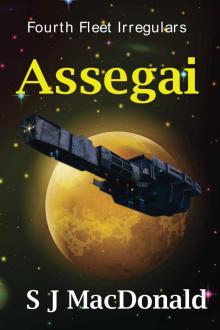 Assegai
Assegai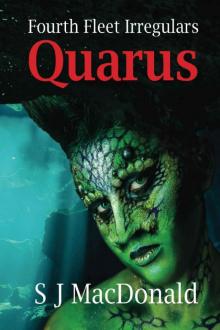 Quarus (Fourth Fleet Irregulars Book 6)
Quarus (Fourth Fleet Irregulars Book 6)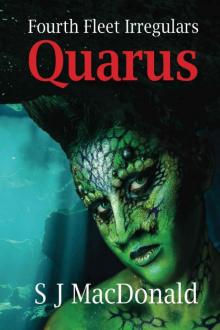 Quarus
Quarus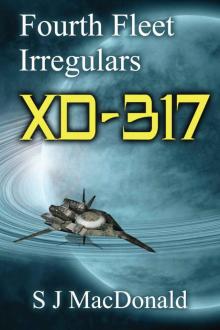 XD:317 (Fourth Fleet Irregulars)
XD:317 (Fourth Fleet Irregulars) New Title 2
New Title 2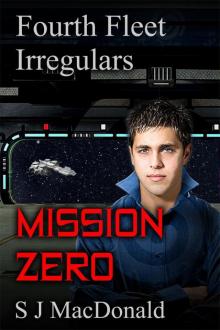 Mission Zero (Fourth Fleet Irregulars)
Mission Zero (Fourth Fleet Irregulars)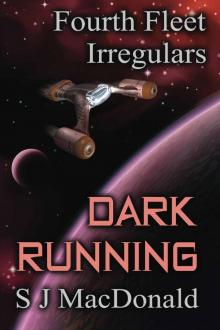 Dark Running (Fourth Fleet Irregulars Book 4)
Dark Running (Fourth Fleet Irregulars Book 4)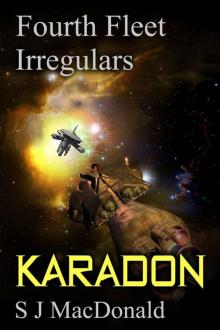 Karadon (Fourth Fleet Irregulars)
Karadon (Fourth Fleet Irregulars)